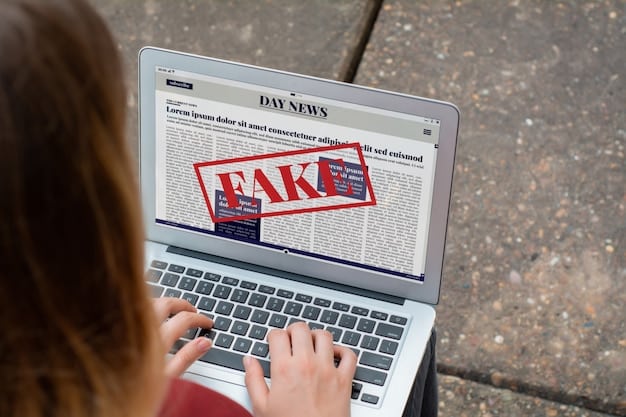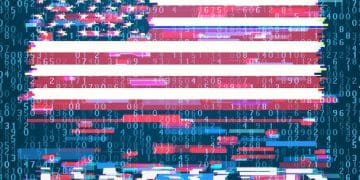Disinformation Campaigns & Global Conflicts: Protecting US Elections

Disinformation campaigns significantly impact global conflicts by undermining trust, manipulating public opinion, and exacerbating social divisions, posing a direct threat to the integrity of US elections and national security.
The spread of disinformation has become a critical concern in the context of global conflicts, with significant implications for the security and stability of nations, particularly the United States. Understanding **the impact of disinformation campaigns on global conflicts: protecting US elections and national security** is crucial for safeguarding democratic processes and maintaining national integrity.
Understanding Disinformation and its Global Reach
Disinformation, defined as deliberately false or misleading information intended to deceive, has evolved into a sophisticated tool utilized by state and non-state actors alike. Its global reach is amplified by the interconnected nature of the internet and social media platforms, making it easy to disseminate false narratives rapidly and widely.
The Evolution of Disinformation Tactics
Disinformation tactics have evolved significantly over time, from traditional propaganda to sophisticated cyber-enabled campaigns. These tactics often involve creating fake news websites, manipulating social media algorithms, and using bots to amplify misleading content.
Key Players in Disinformation Campaigns
Various actors, including nation-states, political groups, and individual hackers, engage in disinformation campaigns. Understanding their motives and methods is essential for countering these threats effectively.
- Nation-states use disinformation to advance their geopolitical interests and undermine their adversaries.
- Political groups deploy disinformation to influence public opinion and electoral outcomes.
- Individual hackers spread disinformation for financial gain or ideological reasons.

The consequences of disinformation can be far-reaching, affecting not only political landscapes but also public health, economic stability, and social cohesion. Recognizing the signs of disinformation and developing strategies to combat it are therefore paramount.
Disinformation’s Impact on Global Conflicts
Disinformation campaigns play a significant role in fueling and exacerbating global conflicts by manipulating public perception, eroding trust in institutions, and inciting violence. The strategic use of false information can destabilize regions and undermine international relations.
Case Studies of Disinformation in Conflict Zones
Several conflict zones around the world have been significantly impacted by disinformation campaigns. These case studies provide valuable insights into how disinformation is used and its effects on the ground.
The Role of Social Media in Spreading Disinformation
Social media platforms have become key vectors for the rapid dissemination of disinformation. The algorithms that govern these platforms often prioritize engagement over accuracy, leading to the amplification of false and misleading content.
- Social media algorithms can create echo chambers where users are primarily exposed to information that confirms their existing beliefs.
- The anonymity afforded by social media allows malicious actors to spread disinformation without fear of accountability.
- The speed at which information spreads on social media makes it difficult to debunk false narratives before they gain traction.
The manipulation of public opinion through disinformation can have devastating consequences, especially in already volatile regions. It is crucial to address the spread of disinformation effectively to mitigate its impact on global conflicts.
Protecting US Elections from Disinformation
The integrity of US elections is increasingly threatened by disinformation campaigns designed to sow discord, undermine voter confidence, and influence electoral outcomes. Protecting US elections requires a multi-faceted approach involving government agencies, social media platforms, and the public.
Vulnerabilities in the US Electoral System
Several vulnerabilities in the US electoral system make it susceptible to disinformation attacks. These include outdated voting infrastructure, decentralized election administration, and the prevalence of social media as a primary source of information.
Strategies for Countering Disinformation
Effective strategies for countering disinformation in the context of US elections include strengthening cybersecurity, improving media literacy, and enhancing collaboration between government agencies and social media platforms.
- Strengthening cybersecurity can protect voting systems from hacking and manipulation.
- Improving media literacy can help voters distinguish between credible and false information.
- Enhanced collaboration between government agencies and social media platforms can facilitate the দ্রুত removal of false content.

By addressing these vulnerabilities and implementing effective countermeasures, the US can better protect its elections from the harmful effects of disinformation.
Disinformation and National Security
Disinformation campaigns pose a direct threat to US national security by undermining public trust in government, creating social divisions, and weakening alliances. Addressing this threat requires a coordinated effort across government agencies, the private sector, and civil society.
The Impact on Public Trust and Social Cohesion
Disinformation can erode public trust in government institutions and exacerbate social divisions, making it harder to address critical national challenges. Restoring trust and promoting social cohesion are essential for national security.
Weakening International Alliances
Disinformation campaigns can be used to sow discord among allies, weakening international alliances and undermining US foreign policy objectives. Maintaining strong alliances is crucial for addressing global threats effectively.
Countering disinformation requires a comprehensive strategy that includes strengthening cybersecurity, promoting media literacy, and enhancing international cooperation. By addressing these challenges, the US can better protect its national security interests.
The Role of Media Literacy in Combating Disinformation
Media literacy plays a critical role in equipping individuals with the skills and knowledge to critically evaluate information and distinguish between credible sources and disinformation. Promoting media literacy education is essential for building a more resilient society.
Educating the Public
Educating the public about disinformation tactics and how to identify them is crucial for empowering individuals to make informed decisions. Media literacy education should be integrated into school curricula and community programs.
Promoting Critical Thinking
Promoting critical thinking skills can help individuals to evaluate information more effectively and resist manipulation. These skills include analyzing sources, identifying biases, and verifying facts.
By promoting media literacy and critical thinking, societies can become more resilient to the harmful effects of disinformation.
Strategies for Combating Disinformation Campaigns
Combating disinformation requires a multi-faceted approach that involves government agencies, social media platforms, the private sector, and civil society. Effective strategies include strengthening cybersecurity, enhancing media literacy, and promoting fact-checking initiatives.
Government Initiatives
Government agencies can play a critical role in combating disinformation by coordinating efforts across different sectors, providing resources for media literacy education, and enforcing laws against malicious actors.
Social Media Platform Responsibilities
Social media platforms have a responsibility to prevent the spread of disinformation on their platforms by implementing algorithms that prioritize accuracy over engagement, removing false content, and promoting media literacy among their users.
Private Sector Contributions
The private sector can contribute to combating disinformation by developing technologies that detect and remove false content, supporting media literacy initiatives, and investing in fact-checking organizations.
By working together, these different actors can create a more resilient information environment and protect societies from the harmful effects of disinformation.
| Key Point | Brief Description |
|---|---|
| 🚨 Election Vulnerabilities | Outdated systems and decentralized admin make US elections susceptible. |
| 🌐 Disinformation’s Reach | Spreads via state actors on social media, impacting public perception. |
| 🛡️ Countermeasures | Improve cybersecurity, enhance media literacy, and promote collaboration. |
| 🤝 International Cooperation | Strengthening alliances combats disinformation effectively. |
FAQs
▼
Disinformation is deliberately false or misleading information spread to deceive and manipulate public opinion.
▼
It fuels conflicts by eroding trust, inciting violence, and destabilizing regions by manipulating perceptions.
▼
Strengthening cybersecurity, enhancing media literacy, and collaboration are crucial for election security.
▼
It equips individuals with the skills to critically evaluate information and resist manipulation effectively.
▼
They must prevent the spread of disinformation by prioritizing accuracy and removing false content swiftly.
Conclusion
In conclusion, the insidious impact of disinformation campaigns on global conflicts is undeniable, posing a significant threat to the integrity of US elections and national security. Addressing this challenge requires a concerted effort from governments, social media platforms, the private sector, and individual citizens to promote media literacy, strengthen cybersecurity, and foster international cooperation. It is essential to recognize and counteract disinformation to safeguard democratic values and ensure national stability.





